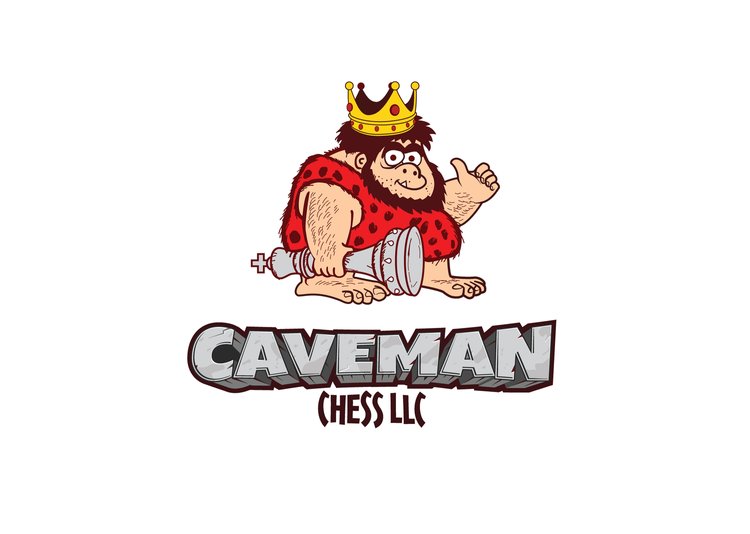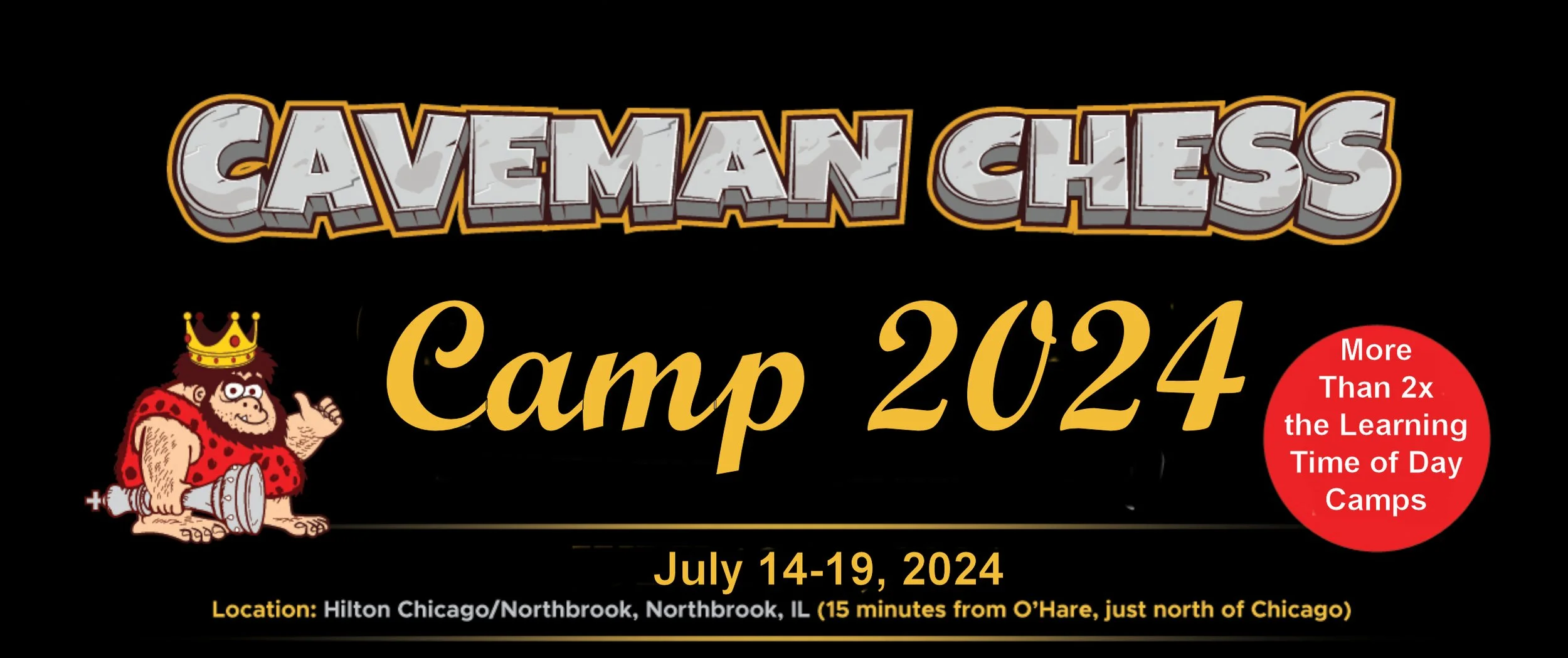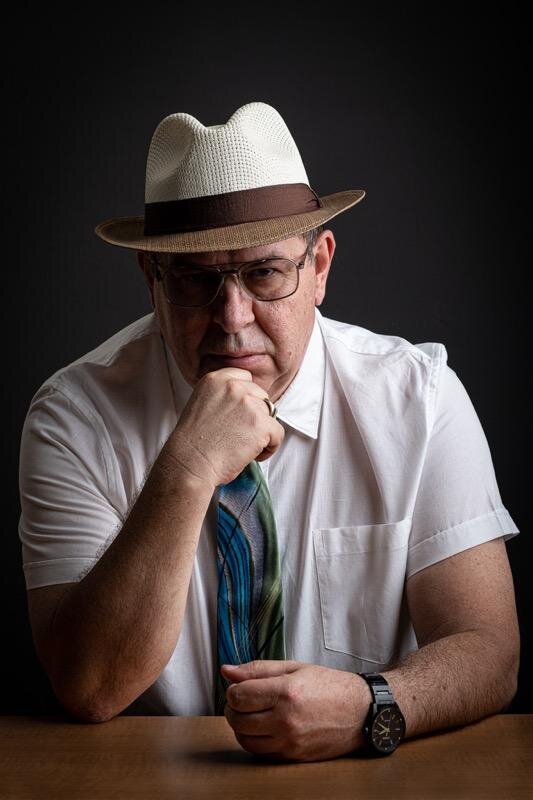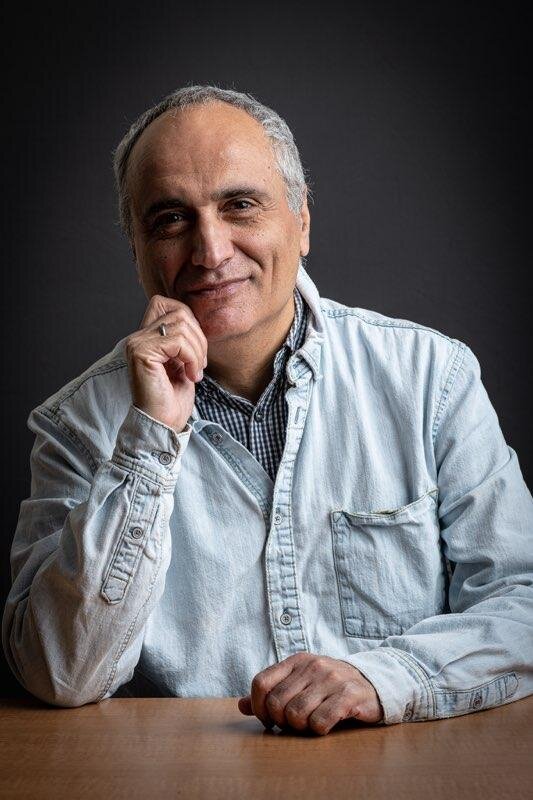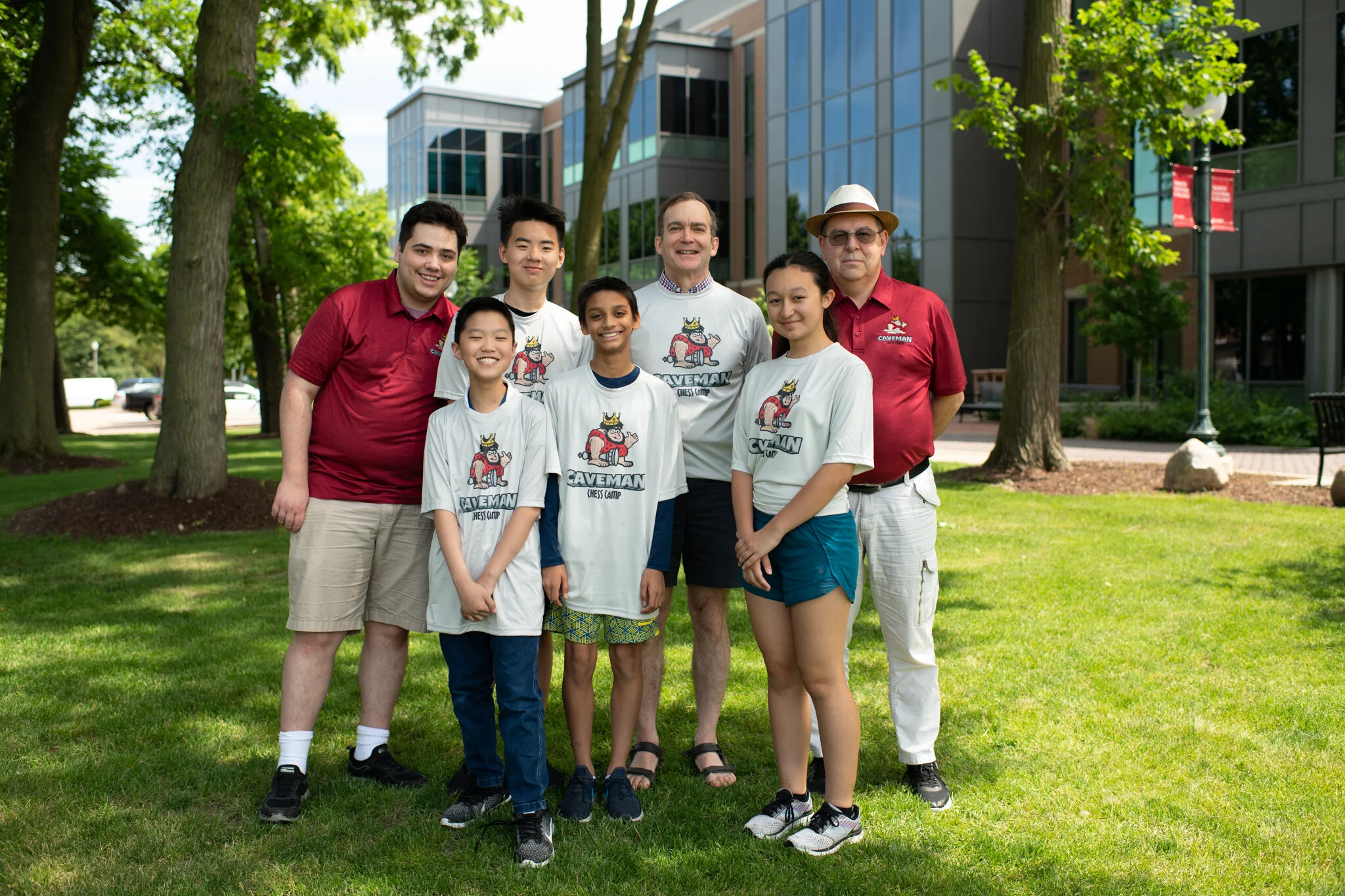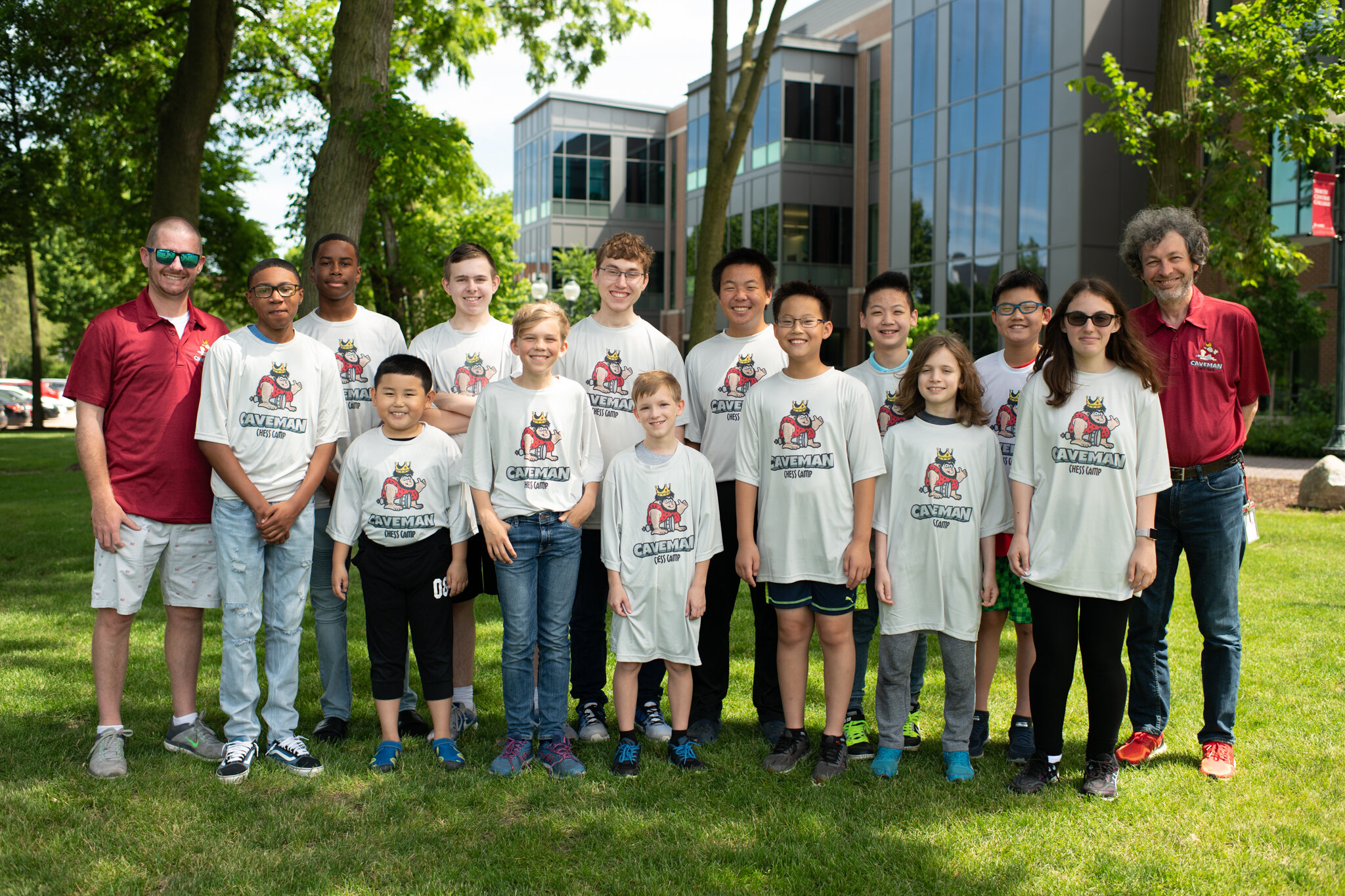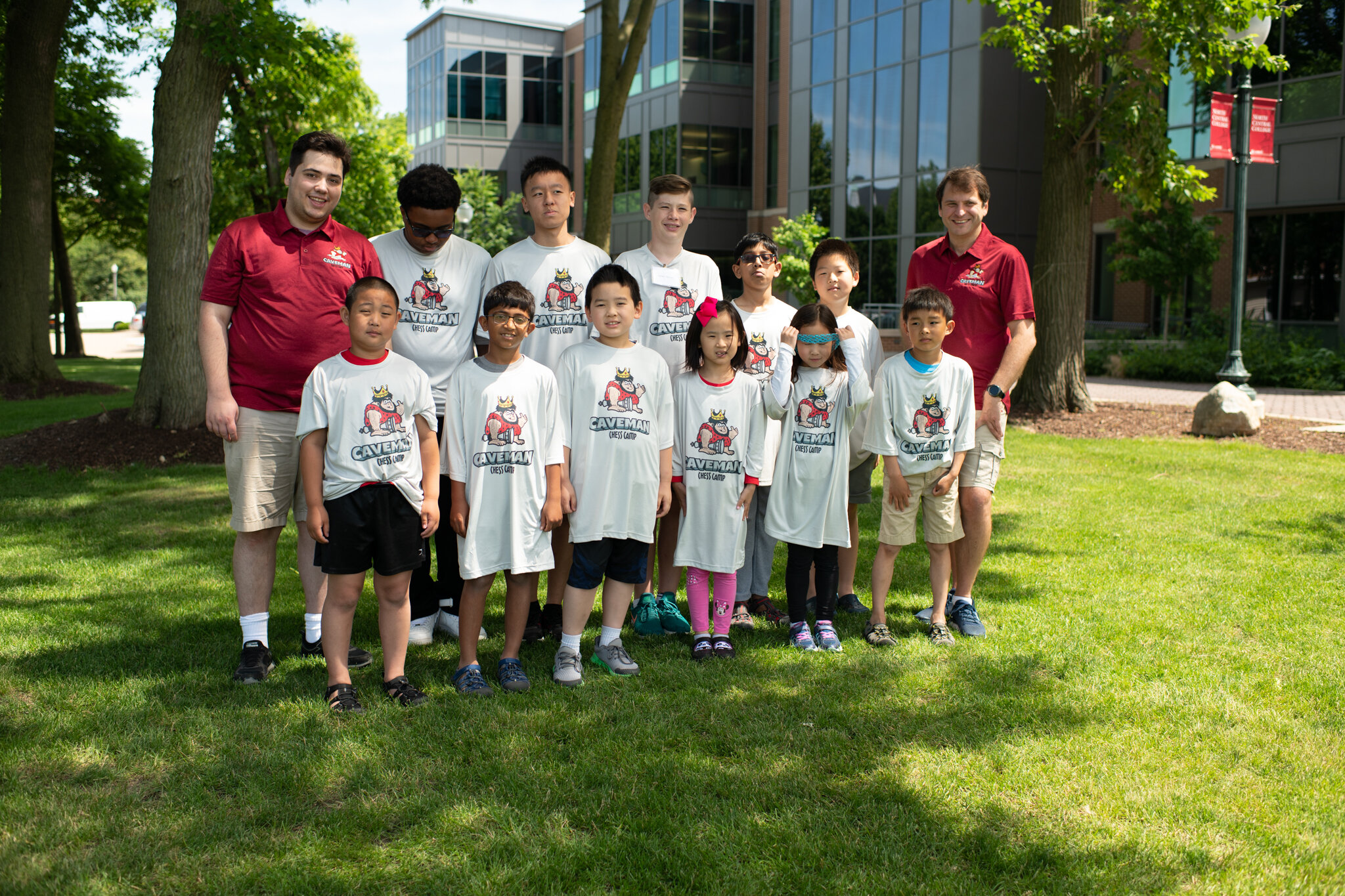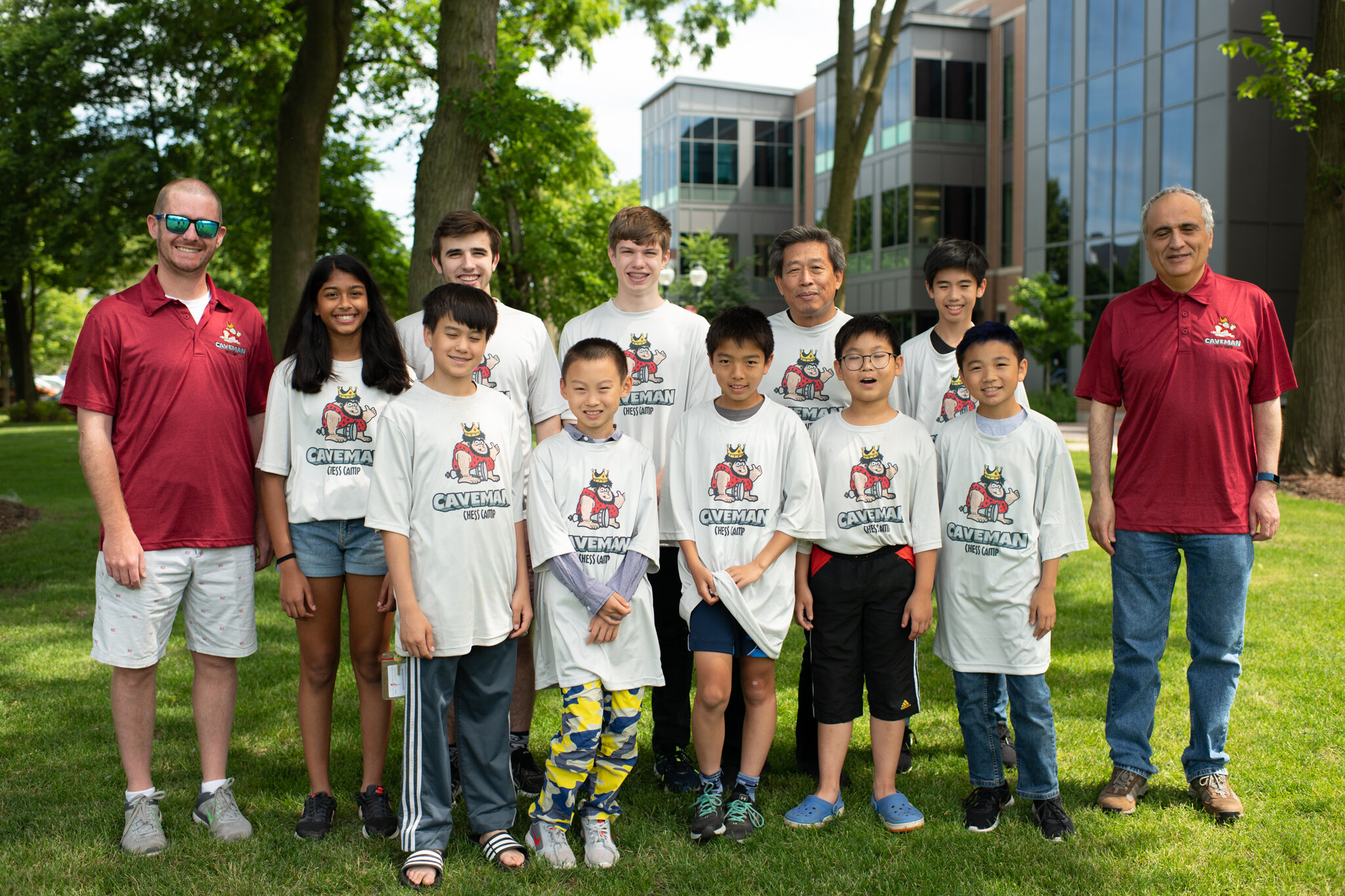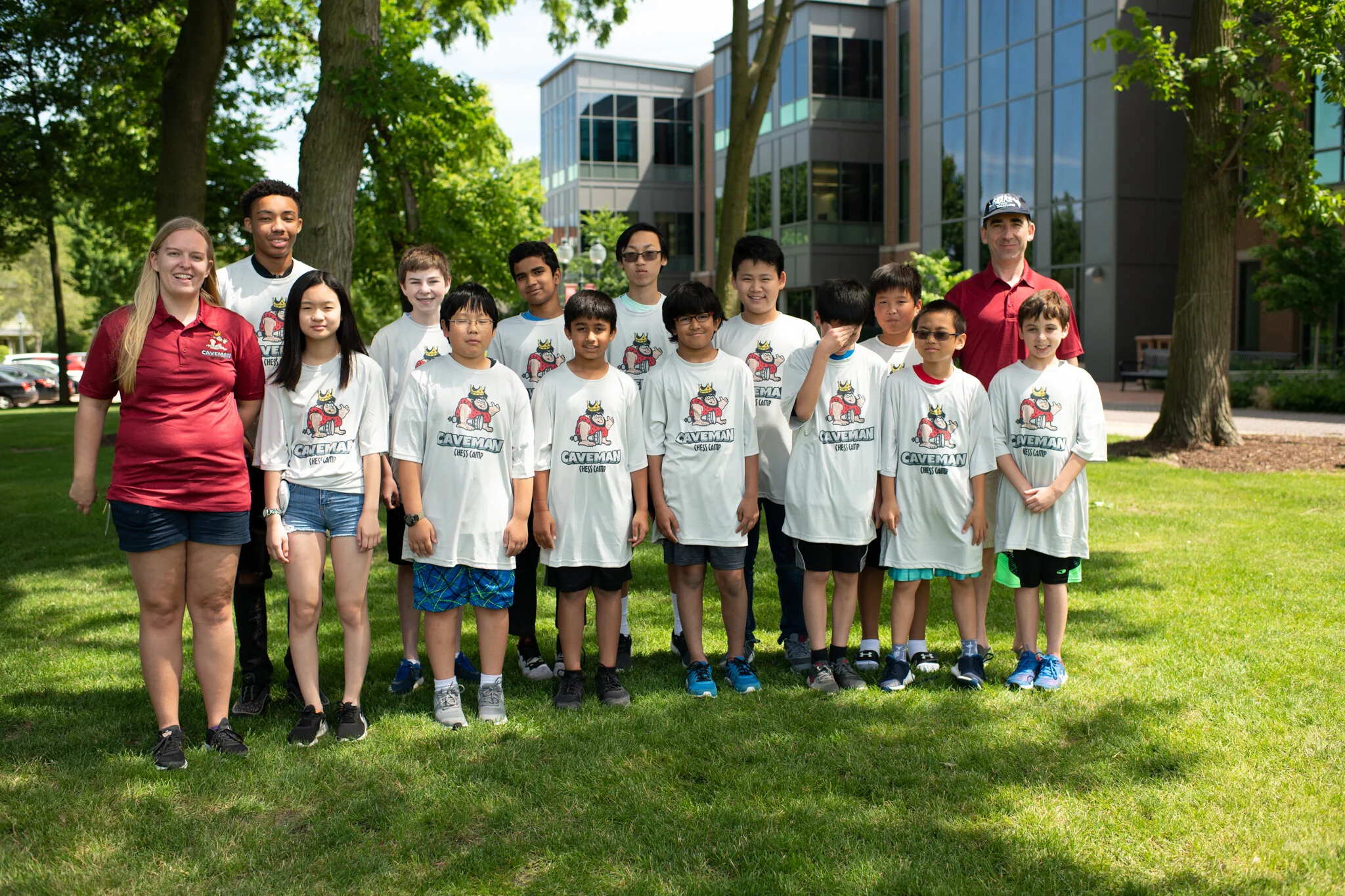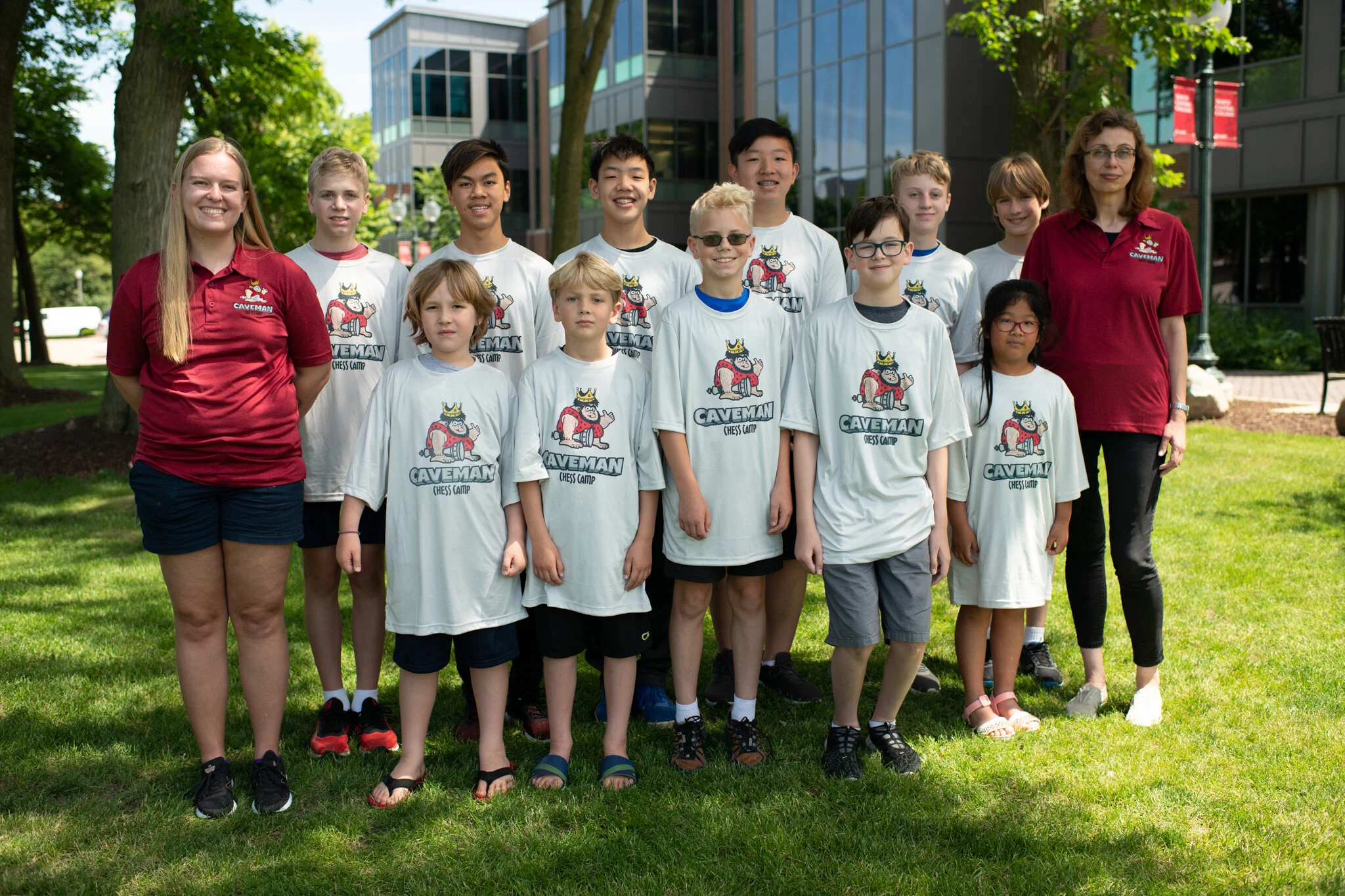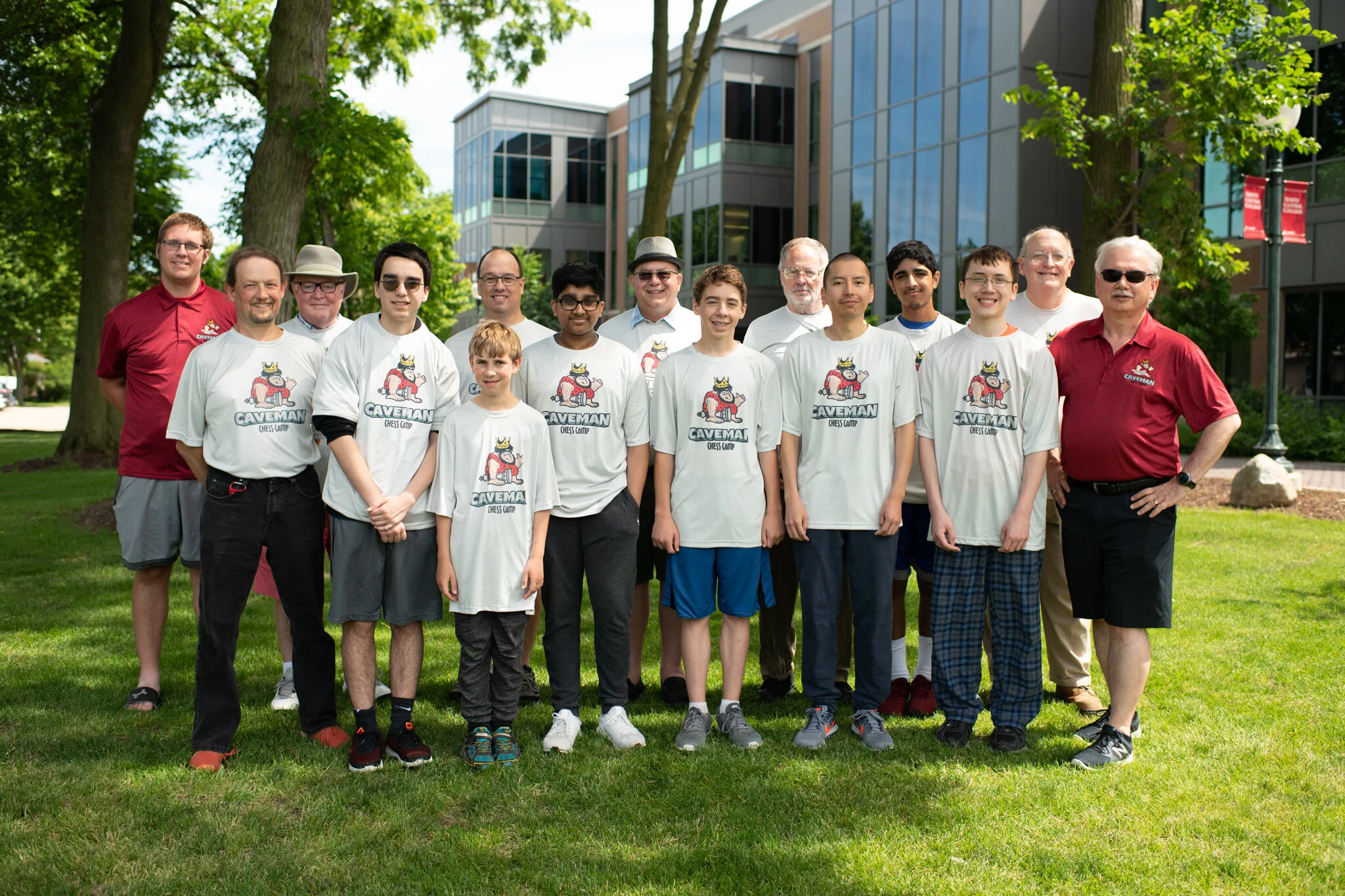REGISTRATION OPENING April 1, 2024
Welcome to the 2024 Caveman Chess Camp
July 14-19 at Hilton/Chicago-Northbrook
2855 North Milwaukee Avenue, Northbrook, IL 60062
Following the US Blind Open, US Junior Open, US Senior Open, Caveman Mediar Open and other events, July 12-14, $40K in prizes!
Caveman Chess Camp offers six unique "camp-within-a-camp" options, catering to each student's diverse needs with various classes in each section. Campers can choose to be residents or commuters.
Our camp is inclusive, welcoming children under 10, adults, and everyone in between, with policies designed for age-appropriate instruction.
The camp is divided into sections as follows, with eligibility based on past or present ratings:
Chess Explorer: This program targets novices to 1500-rated players, mainly children and young adults, with classes organized by age and skill level.
Intensive Study: Split into five subgroups:
Advanced Youth — For players rated 1500 and above.
Advanced Girls — For girls with ratings of 1400 and above.
Advanced Adult — For individuals over 17 years old or rated above 1700.
Adult Fundamentals—This is exclusively for adults, with the potential inclusion of mature young students if necessary for class size. It is aimed at novices to sub-1500 players. Those rated between 1300 and 1500 may opt for Advanced Adult or Adult Fundamentals. The focus is on general meta-theory and positional theory.
Master Class—This class is reserved for players rated 2000 and above and has stringent entry requirements. The average rating for the past three years has been 2170, and it often features multiple masters.
Kevin Bachler, Camp Director, FIDE Master, FIDE Trainer, US Chess Life Master, and US Chess Professional Chess Coach, annually recruits top instructors for the camp.
Details on the 2024 instructors will be announced soon.
A week of high quality instruction
A camp with for all ages, abilities, and experience
A tailored experience via our “camps-within-a camp” approach
An immersive learning experience by engaging directly with
fellow campers
with Instructors
Premier players and teachers
Instructors are mostly internationally titled:
FIDE Masters, International Masters, Grandmasters, FIDE Trainers, or
Nationally titled US Chess titled Masters, Senior Masters, chess coaches, etc.
Some of our youngest and beginning students, may received well-established educator who is an Expert or possibly high-class A strength, and trained in classical chess instruction
The immersive experience fosters accelerated learning and new chess friendships and resources
11 classes tailored to age and strengh
14 classes for Intensive Study
Rotating instructor staff
Base instructor for approximately 50% of classes
Rotating instructors for the remaining 50%
All campers received grandmaster instruction
Classical instruction
Advocating for comprehension over memorization
Provides better learning transference to other topics
Chess-related activities
Simultaneous exhibitions
A championship tournament tailored to age and strength
Tournament and assignments differ
Master and Grandmaster review of championshp tournament games
US Chess rated quick chess tournament
Unrated Blitz and bughouse tournaments
13 hours each day of chess and physical activities
Physical activity is a key part for all chess players
Roughly double what’s provided at most day camps
Emphasizing the importance of being well-rounded
A camp tee-shirt
A complimentary year-long membership to Chessable Pro, a chess training app supported by scientific research.
Several National Championship Chess tournaments precede the camp during part or all of the July 12-14th weekend- allowing campers to learn about multiple types of chess. All tournament July 12-14th unless shown otherwise
2024 U.S. Junior Open ( born after January 1, 2003)
2024 U.S. Senior Open, (born before July 13, 1973)
2024 Caveman Medior Open (players born after July 12, 1973 and before January 2, 2003 )
U.S. Blind Open Championship.
Caveman Beginner Open 1 (July 13)
Caveman Beginner Open 2 (July 14)
US Junior Blitz (July 13)
Caveman Medior & US Senior Quick Chess (July 13)
The camp welcomes all players.
Players under 10 years of age (born after July 14, 2014) require a chaperone. There is a maximum of four campers per chaperone. The resident chaperone fee includes all meals. The non-resident fee includes meals like a non-resident camper—lunch and Dinner S-Th.
Roommates: We strongly encourage campers to get vaccinated. Roommates need to request each other on their registration form. Camp space is filled first-come, and spots cannot be held for a late-registering roommate.
To facilitate a positive camp experience, we request prior communication for players with physical challenges, ADHD, or spectrum disorders.
“This camp is definitely tailored for chess lovers, and it was amazing.”
Below you can find important information on the Caveman Chess Camp.
Items to Complete Before Registering
Register
Added Value of an Overnight Camp
Camp Section & Class Assignments
Tournament Assignments
Want to Register for a Higher Section?
Hotel Information and Registration
Save Money!! Hotel Room Sharing Information
Chaperones and Chaperone Castling
Camp Prices
Travel Information
Quick Links & Downloads
Detailed Class Descriptions
Evening Lectures for Intensive Study Groups & General Public
COVID and Other Policies
Camp Schedule
Camp Photographer
Typical Camp Questions and FAQ
Tax ID and Address
Have you considered the value of an overnight camp compared to a day camp? We operate both and find each has merits. While overnight camps are more costly, they offer greater "cost per benefit" efficiency. Let's explore the reasons for this.
Day camps cater in part to parents needing childcare. Arrival and departure schedules allow for approximately five to six solid hours of instruction daily, plus a few hours for casual learning and games like Blitz and Bughouse.
Overnight camps, on the other hand, offer a comprehensive experience. Students engage in chess discussions with peers and mentors from morning to night. During meals, they can converse with a grandmaster, gleaning insights on optimal strategies for the London System or evaluating Bronstein's versus Najdorf's literature on the pivotal Zurich 1953 chess tournament, which spotlighted the King’s Indian Defense.
The immersive nature of overnight camps broadens the educational environment to include daily analyses of championship games, communal meals, and evening group activities. This collective experience bolsters the day's lessons and facilitates a "learn and confirm" process among participants.
These elements combine to render overnight camps a more intensive educational journey.
Class assignments prioritize strength and age, with a stronger emphasis on the former. We primarily consider US Chess and FIDE ratings for placement. Other ratings are given less weight. If rating information is lacking, we may use additional data, including actual games and losses.
There exists a common misperception among chess parents that their children should advance to a higher camp section to face stronger players, akin to moving up a division in a tournament. However, this is usually not advisable. A class designed for 1500-rated players aims to teach them subsequent skills. Advancing them prematurely bypasses essential topics and puts them in a setting where they are expected to know material they have not yet covered. It's analogous to suggesting that because a child earned "A’s” in 3rd-grade math, they should skip ahead to 6th-grade math.
You may hear on the first day that your student isn’t “learning anything new.” There are two reasons for this:
It's important to understand that students at the same rating level may not necessarily have the same knowledge. For instance, while every student should know about the Four Elements of Chess, which includes analyzing using these elements, many students lack experiential knowledge of this topic. Similarly, most students are not familiar with Steinitz's Six Meta-Principles of Chess, and therefore lack experiential knowledge of using these principles. This lack of knowledge can hinder their progress towards expert level. However, because we begin with something as simple as the “Four Elements” some students may become impatient with the learning process and look for shortcuts, skipping over important topics they think they already know.
To address this issue, we walk students through several games using these tools, and by the end of the process, students of all ages often express their surprise by saying, "Why didn't anyone tell me this before?" Unfortunately, some parents may not understand the importance of these topics and may feel that the instructor is wasting time on topics that their child already knows. However, it's important to remember that if the student knew these topics, their rating would already be much higher.In the initial classes, some effort is dedicated to establishing a common foundation and language for all. This is crucial for the ongoing development of students throughout the week. Learning isn't achieved by the wave of a magic wand; it involves engaging with and evaluating ideas throughout the week, then carrying those concepts and methodologies forward to facilitate continuous learning.
Please allow us the time to bridge learning gaps, ensuring students can progress more smoothly.
Remember that a camp section might have multiple classes. Based on the number of campers, there could be two or more Explorer classes of similar rank but different ages, or two or more Advanced Youth classes separated by age. It's important not to presume that one class is superior to another.
In modern chess tournaments, such as the camp championship, the competition is organized into various sections. These sections do not always align with the camp class divisions. For instance, students from the same class may be distributed across different tournament sections. Additionally, while age is almost irrelevant in determining tournament groupings, it plays a role in the assignment of camp classes.
Further, the camp tournament is about instruction and learning, not about only playing stronger players. It creates conditions that emulated a serious rated tournament and allow students to learn and try.
That a player has occasionally done well against higher-rated players isn’t an indicator that they are moving ahead. A good place to check is the players US Chess rating record. On the player’s main rating page choose “Show Game Statistics.”
What we will often see with players trying to advance too quickly is moderate scores against higher rated players - say 50% - but also moderate or even lower scores against a particular lower rating level - showing that the player is missing something and isn’t ready to advance.
If you wish to register yourself or your child for a higher section, do not call or email us. We are sorry, but we receive a high volume of such emails, and they make it very difficult to prepare for the camp.
Instead, please follow the Class-Exception-Policy. Email us **ONLY IF** if you have a question about how to follow that policy.
If your camper clearly qualifies for a section - for example, if they are US Chess Standard 1500 - a section like Advanced Youth is the correct registration. If they are short of qualification, for example, if they are 1680 and wish to be in Advanced Adult, register them in the appropriate section and request an exception to move up. See http://www.cavemanchess.com/class-exception-policy. If there is a pricing difference, we will charge the difference as of the time of your initial registration.
Chess has returned to mostly normal, so we are back to less flexibility in the policy to move up. Players will need to build a strong case to be in a higher section - both as a responsibility to themselves and to their fellow campers who expect them to participate at that higher level and contribute to class at that higher level.
Register for your hotel room here: https://cavechess.cc/Festival-Camp-Hotel
The camp will be at the Hilton-Chicago/Northbrook.
Under age 18 campers will be assigned to a single floor, separate from other guests.
We will have camp counselors on the same floor.
Camp pricing is $125 a night for 1-4 people per room.
Campers can save significantly with multiple people per room.
Each room includes a refrigerator that can be used for various medicines
The sink for each room is separate from the bathroom, so multiple people can get ready simultaneously
Camp meals are part of camp pricing, not hotel pricing
Information on Tournament Hotel Rooms is at this link: <TBA>
A travel and room-sharing forum is at Caveman Chess Community Forum
Camp hotel rooms are $125 per night for 1-4 people, double beds available. Four to a room brings the cost to $32 per night - obviously much cheaper per person per night, a significant savings.
You can post in our forums for roommates at https://cavechess.cc/Festival-Room-Travel-Forum, or look there to find roommates.
Camp fee includes:
Camp registration, meals, a camp t-shirt and a one-year subscription to Chessable Pro assigned the week after camp. Commuters do not receive breakfast. Details below.
The normal fee includes camp registration, Sunday dinner, M-Th breakfast-lunch-dinner, and Friday breakfast. Each camper will also receive a one-year subscription to Chessable Pro assigned the week after camp. Campers must register separately for a hotel room. Under age 18 campers will all be housed on one floor of the hotel. See hotel information for details.
The commuter fee includes camp registration, lunch, and dinner, M-Th.; Non-residents still need to register Sunday afternoon and arrive for the Sunday evening simul by 5:50 p.m. Non-residents need to arrive at the tournament room by 7:50 a.m. M-F and will plan to depart at approximately 9:00 p.m. Sun-Thu, and noon on Friday. If desired, non-residents may purchase additional meals at the cafe.
CREDITS and DISCOUNTS
To register siblings and receive a 15% discount on the total order, please email us with the subject "Sibling Discount," and we will send you a discount code.
Seniors aged 62 and over are also eligible for a 15% discount. Email us with "Senior Discount" in the subject line, and we will provide you with a personalized discount code.
If you have a credit from previously canceled events, email us with "Prior Credit" in the subject line, and we will issue you a personalized code to redeem your credit.
Withdrawals: A $250 fee is deducted for camp withdrawals. To withdraw, visit our withdrawals page at https://cavechess.cc/withdraw. Requests received by 10 PM CST on June 30th will be refunded, minus a $250 non-refundable deposit fee. After June 30th, no refunds will be issued, but substitutions are permitted. (Should you find someone to take over your reservation, we will accommodate the change upon receiving your written consent.) This policy overrides our General Refund Policy.
Über-Business is our shuttle provider for airport rides from O’Hare to Northbrook
Due to excessive regulatory fees, suburban hotel shuttles do not provide travel from airports to the hotel. Hotel shuttles do provide local travel
We are working to see if we can use the hotel shuttle TO the airport
We are structuring a website to arrange combined Über-Business shuttles for cost savings
Our forum at Caveman Chess Community Forum provides the ability to connect with others for room-sharing
Driving: The hotel is close to the intersection of I-294 and Willow Road, a major east-west thoroughfare in the northern Chicago suburbs. Numerous Interstates connect easily to I-294.
One can connect easily to the hotel from Willow and I-294. Willow Road west to Sanders, Sanders south to Winkleman. Winkleman west to the hotel, just short of the intersection of Milwaukee Road (Route 21) and Winkleman.
Amtrak and Metra rail stations are within a few miles at the Glenview, IL station. There are other nearby stations also. Hotel shuttle services can be arranged to these locations.
One can connect to the EL Blue Line to Jefferson Park and take busses north
One can connect to the EL Blue Line to Mayfair, go a block to the Metra Milwaukee District North line to Glenview, and get a hotel shuttle
The Moovit app is a particularly good app for coordinating multiple forms of transportation
Watch for additional information on shuttles in early May.
These links are not yet updated for 2024. To see the various tournaments, preceeding camp go to https://www.cavechess.cc/tournaments
Look to share travel or a room - Forum — Caveman Chess
1. Chess Explorer: Intended for all players from novice through 1500, geared toward children and young adults. There will be multiple classes in this section separated by age and strength
2. - 6. Intensive Study
Evening Lecture Series is included in each of the Intensive Study Options
Intensive Study students are combined into multiple similarly rated sections for the championship tournament, irrespective of their Intensive Study class. Master Class students are separated, Fundamental Adult students are separated to the extent possible
Class requirements will be strictly enforced. Exceptions are made only upon rigorous examination and approval by the camp director. Click here for details.
2. Advanced Youth: Open to players under age 18 with 1500+ US Chess Standard rating – for strong students. The option includes greater classroom rigor and the evening lecture series after which students join evening camp activities including separate sections of the blitz and bughouse tournaments. Appropriately rated and mature Youth students may be placed into the Adult Class to ensure it is full.
3. Advanced Girls: Open to female players under age 18 with 1400+ US Chess Standard rating – for strong students. The option includes greater classroom rigor and the evening lecture series after which students join evening camp activities including separate sections of the blitz and bughouse tournaments. Females may enter any of the advanced sections - the only difference here is to encourage female camaraderie if desired.
4. Advanced Adult: Open to players age 18 and over, OR US Chess Standard rating of 1700+. This option is intended for serious adult students and includes the evening lecture series and greater classroom rigor. This session will admit serious, mature-acting youth students who meet the requirements and have camp director approval. To the extent possible, a goal of this class is to have a strong, adult, class.
5. Fundamental Adult: This option is only open to players age 18 and over. It is for the novice to moderate-strength adult interested in strengthening their chess knowledge for themselves or for the additional purpose of teaching others. This option includes takeaway materials and, for those interested in coaching, a letter of recommendation for the USCF Certified Chess Coach Program. Stronger players should consider Intensive Study-Advanced Adult.
6. Intensive Study - Master Class:
This class is for serious players (including mature-acting youth) US Chess Standard rated over 2000. The class includes the evening lecture series, instruction by GMs only, electronic Chessbase format class materials, and the tournament section will be limited to the strongest players only (allowances for camp size and an even number of players.)
Camp policies and procedures are outlined in documents provided between registration and the start of camp, including the camp handbook. We are currently working on making these documents immediately downloadable upon registration.
The camp will follow Illinois COVID protocols and policies that provide a safe environment for our campers. We suggest that all campers who are eligible consider vaccination. See the current COVID policies here:
.
We use Chessbase to share game information. Before registering, campers without a free Chessbase account should create one at https://account.chessbase.com/en/create-account.
Chessable is also employed to aid in training. You will receive a FREE one-year Chessable Pro account subscription. If you lack a Chessable account, please create a free one at http://www.chessable.com before registering, as Chessable will upgrade an existing account.
While US Chess membership is not mandatory, it is highly recommended. The Sunday Blitz and Wednesday evening Quick chess tournaments and the numerous events before the camp are US Chess rated.
Memberships for students up to 12th grade may be purchased for only $9 plus a $1 service feed buy using a discount voucher from https://cavemanchess.myshopify.com/
If you are interested in paying for camp over time, select Shop Pay Installments at checkout
Refunds:
Camp Refund Policy: Written cancellations (post, fax, or email) received by 10 PM CST, July 15th will receive a refund less a $200 non-refundable deposit fee. No refunds are given after July 15th although substitutions are accepted. (If you can find someone willing to take the reservation, we will honor that with your written validation.) This policy supplants our General Refund Policy for the 2023 Camp.
For more information:
Contact Kevin Bachler, camp director, for questions about staff or instructional content.
Evening Lecture Series (Included for Intensive Study Campers)
Fees:
Online Registration: $25 until 7/15, $30 after 7/15. $10 for adult chaperones (US Chess unrated) who are chaperoning youth under age 18. Purchase all 4 lectures for $80 by 7/15, $100 after 7/15 (adult chaperones $25)
At the Site: $30. Onsite registration will still take place on King Registration; cash will not be accepted.
Adults (over age 17) who are not campers may also attend the Intensive Study evening lecture. Local youth under age 18 may attend the lecture if accompanied by an adult (limit 3 youth per adult). There is a special fee for chaperone adults who are unrated or not US Chess members.
Lectures last one hour and begin at 6:00 pm. Local chess players wishing to attend should arrive at 5:45 pm. Lectures are by camp GMs. Lecture topics are below. No refunds on advance registration. The lecture room is the Schaible Science Center Auditorium, Room 120.
2024 Topics:
Monday: TBD
Tuesday: TBD
Wednesday: TBD
Thursday: TBD
All classes begin at 6:00 p.m. and end by 7:00 p.m.
Intensive Study students automatically participate in the lectures - do not re-register them. Registration for the lectures for non-campers will be online shortly.
Camp Schedule
Camp opens Sunday afternoon with check-in between 2:00 pm and 3:00 pm, followed by an 4:30 orientation meeting, dinner, and an exhibition pitting participants against their class instructor. Monday morning begins with the first round of a week-long tournament. Following each round, players analyze the game with their instructors and then have the first of three daily class sessions with their base or rotating teacher. (A partially rotating instructional schedule allows participants to study with a variety of teachers.) Afternoon class sessions are followed by dinner in the and special activities. Camp closing ceremonies start at 11:00 am Friday with trophies awarded to winners in all competitions. Family and friends are invited to attend. Special activities such as movie, and recreational opportunities, including soccer, frisbee, or basketball, keep things active and interesting.
A 2024 printed schedule is available under Quick Links.
Camp Photographer
Legacy Photography and Videography https://www.capturedlegacy.com/ - is the official camp and tournament photography. Additional photography by key camp staff.
What is your EIN and address so that I can write off the camp under the Child Care Tax Credit?
Employer Identification Number: 82-5006592
Address: 27 Morris Street, Park Ridge, IL 60068
It is our understanding that the cost of overnight camps does not qualify. Please consult a certified accountant for help on this issue, or consult the IRS website. Neither Caveman Chess nor Kevin Bachler provides accounting or tax advice.
How many youth attend?
Typically 100 to 125 youth attend our camps. Most adult campers attend one of the Intensive Study sections. As we add campers we add instructors, intending to maintain a ratio of 8-12 campers per instructor — with the occasional class creeping up to 14 in order to fit classes by age and rating. Classes must have at least 6 students to be a “go”, and special arrangements are made in the event of classes of fewer than 6 participants.
How many adults attend?
Typically our camps see over a dozen adult campers. Sometimes adults have made up as much as 25% of the camp.
What is the predominant range of ages of the campers?
Ages typically range from 7-year-old campers to 50-year-olds-plus; the widest range we have had was from age 6 to age 80. Most participants are ages 10–17, and the largest group ages 11–14. Adults select one of the two adult-oriented Intensive Study sections, although some adults select the Explorer camp, particularly if they wish to attend with their children. Typically, there are over a dozen adult campers at the camp.
What is the predominant range of ratings of the campers?
Ratings range from Beginner to 2400+. The majority of our young campers’ ratings range from unrated/600 to 1200, with the next largest group 1200–1600. There is a strong contingent from 1800 – 2200+. Adult campers generally break into two groups – one of 1000-1400, and the second of 1600 – 2200. We have had 2300’s and 2400’s participate as campers in the Master Class.
How can I view my child’s chess ratings?
Go to the US Chess Federation at www.uschess.org, select “Ratings” then “Player/Ratings Look Up” and enter your child’s name or ID.
Will participants be allowed to travel around campus alone?
Younger campers are informed to travel in a group with a counselor during movement between breaks. Adults may travel freely.
What are your cell/smartphone and other electronic devices policy?
Cell phones and other electronic devices are not prohibited but should be used only during free time. US Chess approved notating devices are allowed.
If a minor participant drives themselves to the program, can they leave whenever they want?
No, at check in the driver’s keys are turned in and given to the directors of the camp. If they wish to leave, a note must be provided from their guardian in advance. Adults may travel freely, but we ask that they notify the camp about their change in plans.
Do you have enforceable consequences for prohibited actions?
Campers who break rules are sent home with no refund.
What if my child is on medication?
Although camp counselors can hold the medication in a locked room, counselors cannot administer the medication to the camper. Hotel rooms have refrigerators.
All campers must be able to administer their own medications.
What is the refund policy?
Written cancellations (post, fax, or email) received June 30 receive a refund less a $200 non-refundable deposit fee. No refunds are given thereafter, but substitutions are accepted (you may exchange the reservation to another person.)
Chaperones and Chaperone “Castling”
Players under 10 years of age (born after July 14, 2014) require a chaperone. There is a maximum of four campers per chaperone. The resident chaperone fee includes all meals. The non-resident fee includes meals like a non-resident camper—lunch and Dinner S-Th.
Chaperones often either treat the camp as a relaxing vacation, or bring work with them to complete during the camp. Chaperones may also “castle” - we’ve had chaperones, with good communication with the camp, switch off during the week - switching one chaperone for another during the week, so each only needs a couple of days off. Also, chaperones could easily room share for multiple rooms of campers, significantly decreasing the chaperone cost.
